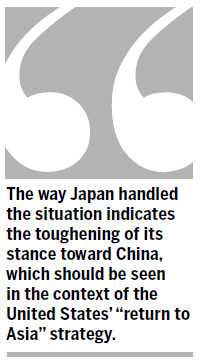Op-Ed Contributors
East Asia calls for peace
Updated: 2010-12-20 08:02
By Li Wei (China Daily)

China and Japan should tread with utmost caution and take appropriate steps to resolve the dispute over Diaoyu Islands
Relations between China and Japan have deteriorated since two Japan Coast Guard vessels collided with a Chinese fishing trawler in the waters off China's Diaoyu Islands in early September.
The illegal detention of the captain of the Chinese trawler by Japanese authorities and his prosecution under Japan's so-called domestic judicial procedures were unprecedented and enraged Chinese people. Japanese politicians even ignored China's "strong representations" against the incidents.
The way Japan handled the situation indicates the toughening of its stance toward China, which should be seen in the context of the United States' "return to Asia" strategy. The actions of the Japanese government, led by the Democratic Party of Japan, are apparently aimed at alienating China diplomatically.
The US' failure to get the desired political and military gains from the wars in Afghanistan and Iraq compelled it to withdraw some of its troops from Iraq and push for peace between Israelis and Palestinians. This, along with the US' declining economic and financial influence, prompted the Barack Obama administration to "return to Asia". The US believes its "return to Asia" strategy will not only help it to continue playing a leading role in the fast-developing continent and create conditions for its economic recovery, but also cope with the rise of China.
The US has strengthened its alliances with the Republic of Korea and Japan to make its "return to Asia" smooth and deal with traditional security issues in the region more effectively. It has worked out emergency military plans to handle possible crises on the Korean Peninsula and to gain the initiative in the Korean Peninsula denuclearization issue. The US has emphasized its "interests" in the South China Sea, too, to prevent its ally countries in the region from breaking away from its fold.
In Southeast and South Asia, it has taken concrete measures to boost political and security ties with member states of the Association of Southeast Asian Nations and India.
The US' unrestrained "return to Asia" and strengthening of its alliance with Japan - an important means of implementing its strategy - have influenced geopolitics in East Asia and caused negative effects on Sino-Japanese relations.
The changes in Tokyo's foreign policy, promoted by the ruling Democratic Party of Japan, is one of the main reasons behind the strained Sino-Japanese ties. Former Japanese prime minister Yukio Hatoyama's government resigned because of the controversy created by his move to "attach more importance to Asia" by changing his country's long-established US-centric diplomatic policy. Hatoyama's spat with American leaders over his efforts to make the US shift its air base from Okinawa added to the pressure on Hatoyama to resign.
Realizing the power the US still wielded, Hatoyama's successor Naoto Kan chose to reverse the previous government's policy and lean toward the US diplomatically.
Japan reaffirmed its diplomatic and security commitments to the US in July. Since then, it has taken a series of measures to strengthen its alliance with the US. Its participation in several US-led military drills in East Asia and the changes it has made in its defense plans because of its unwarranted concerns over China are part of those measures.
The situation, however, is not as grim as it seems. China and Japan have both stressed their willingness to work out a strategic and mutually reciprocal relationship to repair their damaged ties.
But to achieve that, they have to devise a joint strategy, based on mutual trust. China's rapid economic rise and increasing maritime capability may have caused Japan some uneasiness. But Japan's role in the US' strategy of containing China will make it more difficult for Tokyo and Beijing to build the much-needed mutual strategic trust. To remove mutual strategic misgivings, the two countries should view their development strategies in the bigger perspective of peace and development, which is an irreversible trend across the world, and plan their moves accordingly.
But China and Japan have failed to deepen mutual political and strategic trust despite their increasing economic exchanges. And although diplomatic disputes have not hurt their bilateral economic ties, they could hamper further development. The two countries have to open regular consultation and dialogue channels to understand the importance and complexity of their relations, which ultimately will help them remove mutual strategic misgivings.
At a time when people in both countries are particularly sensitive to provocations, Chinese and Japanese leaders should consider the pros and cons of making a statement or taking an action. Public opinion serves as the foundation of bilateral ties. So the two countries should make pre-emptive moves to prevent ultra-nationalist elements from fanning passions. In such situations, regular communication channels can control ultra-nationalist elements on both sides by giving the public the right information. The media on both sides have a big role to play, for they can build mutual trust between the two peoples by providing readers and viewers with objective, unbiased reports about the other country.
Since the Diaoyu Islands are at the center of the dispute between China and Japan, China and Japan have to take positive steps to resolve the issue. And the first step toward resolution should be the formation of a joint panel to explore a workable mechanism.
The author is director of the Institute of Japanese Studies, affiliated to the Chinese Academy of Social Sciences.
(China Daily 12/20/2010 page8)
E-paper

Ear We Go
China and the world set to embrace the merciful, peaceful year of rabbit
Preview of the coming issue
Carrefour finds the going tough in China
Maid to Order
Specials

Mysteries written in blood
Historical records and Caucasian features of locals suggest link with Roman Empire.

Winning Charm
Coastal Yantai banks on little things that matter to grow

New rules to hit property market
The State Council launched a new round of measures to rein in property prices.
